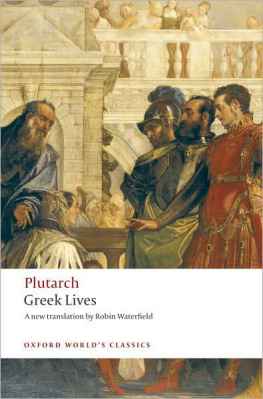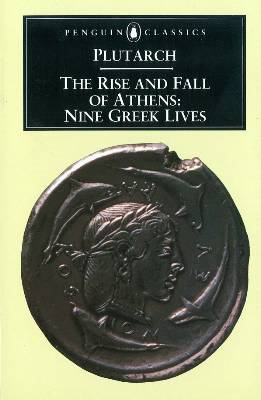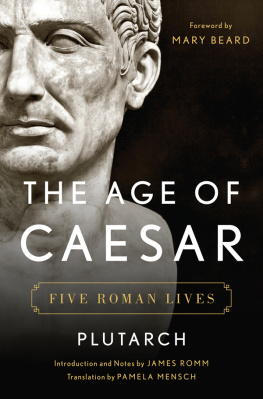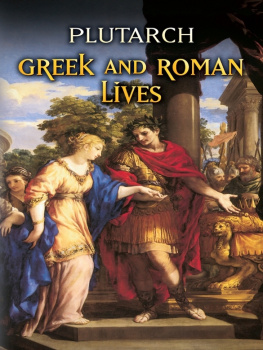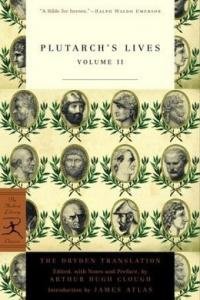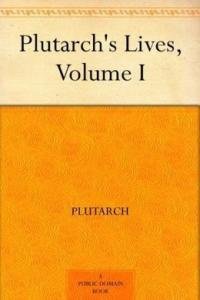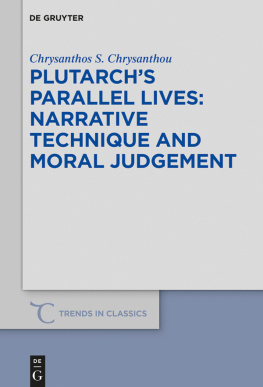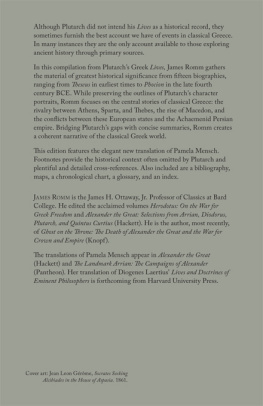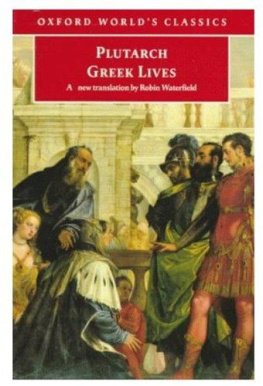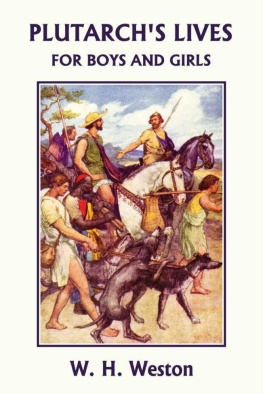PLUTARCH'S LIVES
TRANSLATED FROM THE GREEK,
WITH NOTES AND A LIFE OF PLUTARCH
By
AUBREY STEWART, M.A
Late Fellow of Trinity College, Cambridge
AND THE LATE
GEORGE LONG, M.A.
Formerly Fellow of Trinity College, Cambridge
VOL. III
First published in 1892
This edition published by Read Books Ltd.
Copyright 2019 Read Books Ltd.
This book is copyright and may not be
reproduced or copied in any way without
the express permission of the publisher in writing
British Library Cataloguing-in-Publication Data
A catalogue record for this book is available
from the British Library
Contents
Plutarch
Plutarch, named Lucius Mestrius Plutarchus after becoming a Roman citizen, was a Greek historian, biographer and essayist, known primarily for his Parallel Lives a nd Moralia.
Plutarch was born in AD 46 to a prominent and wealthy family in the small town of Chaeronea, about twenty miles east of Delphi in the Greek region known as 'Boeotia.' Biographical details regarding Plutarch's life are sparse, and the name of his father has not been preserved, but it was probably Nikarchus , from the common habit of Greek families to repeat a name in alternate generations. The name of Plutarch's grandfather was Lamprias, as he attested in Moralia and in his Life of Antony . Through intense scrutiny of Plutarchs writings, scholars have further ascertained that he married a woman named Timoxena, with whom he had at least two sons and a daughter. The daughter, named after her mother, sadly died when she was tw o-years old.
Plutarch studied mathematics and philosophy at the Academy of Athens under Ammonius, a much respected teacher and philosopherand made a number of influential friends during this time. Among these were Quintus Sosius Senecio and Fundanus, both important senators, to whom some of Plutarchs later writings were dedicated. He also travelled widely in the Mediterranean world, including central Greece, Sparta, Corinth, Sardis, Alexandria and two trips to Rome. At some point, though we are unsure exactly when, Plutarch took up Roman citizenship. As evidenced by his new name, Lucius Mestrius Plutarchus, his sponsor for citizenship was Lucius Mestrius Florus, a Roman of consular status whom Plutarch also used as a historical source for his Li fe of Otho .
He lived most of his life at Chaeronea, and was initiated into the mysteries of the Greek god Apollo. Plutarch's duties as the senior of the two priests of Apollo at the Oracle of Delphi (where he was responsible for interpreting the auguries of the Pythia) apparently occupied little of his time however. He led an active social and civic life while producing an extensive body of writing, much of which is still extant. By his writings and lectures Plutarch became a celebrity in the Roman empire, yet he continued to reside where he was born, at Chaeronea, and actively participated in local affairs, even serving as mayor. At his country estate, guests from all over the empire congregated for serious conversation, presided over by Plutarch in his marble chair. Many of these dialogues were recorded and published, and the seventy-eight essays and other works which have survived are now known collectively as the Moralia .
The first biographical works to be written by Plutarch were the Lives of the Roman Emperors from Augustus to Vitellius. Of these, only the Lives of Galba and Otho survive. Plutarchs best known work is the Parallel Lives; a series of biographies of famous Greeks and Romans, arranged in pairs to illuminate their common moral virtues and vices. The surviving Lives contain twenty-three pairs, each with one Greek Life and one Roman Life , as well as four unpaired single Lives . As is explained in the opening paragraph of his Life of Alexander , Plutarch was not concerned with history so much as the influence of character, good or bad, on the lives and destinies of men. Whereas sometimes he barely touched on epoch-making events, he devoted much space to charming anecdote and incidental triviality, reasoning that this often said far more for his subjects than even their most famous accom plishments.
The remainder of Plutarch's surviving work is collected under the title of the Moralia (loosely translated as Customs and Mores ). It is an eclectic collection of seventy-eight essays and transcribed speeches, which includes On Fraternal Affection a discourse on honour and affection of siblings toward each other, On the Fortune or the Virtue of Alexander the Great an important adjunct to his Life of the great king, On the Worship of Isis and Osiris (a crucial source of information on Egyptian religious rites), along with more philosophical treatises, such as On the Decline of the Oracles , On the Delays of the Divine Vengeance and lighter, more humorous writings such as Odysseus and Gryllus an entertaining dialogue between Homers Odysseus and one of Circes enc hanted pigs.
In addition to his duties as a priest of the Delphic temple and his prolific writing, Plutarch was also a magistrate in Chaeronea. He represented his home on various missions to foreign countries during his early adult years, but forever a consummate citizen, he busied himself with all the little matters of the town and undertook even the humblest of duties. According to the eighth/ninth century historian George Syncellus, late in Plutarch's life, the emperor Hadrian also appointed him nominal procurator of Achaea (a roman province, part of modern-day Greece). The veracity of this statement is still hotly contested however. Plutarch died between the years AD 119 and 127 (most likely AD 120; aged seventy-four) in Delphi, Phoc is (Greece).
LIFE OF NIKIAS.
As it appears to me that the life of Nikias forms a good parallel to that of Crassus, and that the misfortunes of the former in Sicily may be well compared with those of the latter in Parthia, I must beg of my readers to believe that in writing upon a subject which has been described by Thucydides with inimitable grace, clearness, and pathos, I have no ambition to imitate Timus, who, when writing his history, hoped to surpass Thucydides himself in eloquence, and to show that Philistius was but an ignorant bungler, and so plunges into an account of the speeches and battles of his heroes, proving himself no t merely one
"Who toils on foot afarBehind the Lydian car,"
as Pindar has it, but altogether unfit for the office of historian, and, in the words of Diphilus,
"Dull-witted, with Sicilian fat for brains."
He often seeks to shelter himself behind the opinions of Xenarchus, as when he tells us that the Athenians thought it a bad omen that the general whose name was Victory refused to command the expedition to Sicily; and when he says that by the mutilation of the Hennas the gods signified that the Athenians would suffer their chief disasters at the hands of Hermokrates the son of Hermon; or, again, when he observes that Herakles might be expected to take the side of the Syracusans because of Proserpine, the daughter of Demeter, who gave him the dog Kerberus, and to be angry with the Athenians because they protected the people of Egesta, who were descended from the Trojans, whereas he had been wronged by Laomedon, king of Troy, and had destroyed that city. Timus was probably led to write this sort of nonsense by the same critical literary spirit which led him to correct the style of Philistius, and to find fault with that of Aristotle and Plato. My own opinion is that to pay too much attention to mere style and to endeavour to surpass that of other writers, is both trifling and pedantic, while any attempt to reproduce that of the unapproachable masterpieces of antiquity springs from a want of power to appreciate their real value. With regard, then, to the actions of Nikias described by Thucydides and Philistius, more especially those which illustrate his true character, having been performed under the stress of terrible disasters, I shall briefly recapitulate them, lest I be thought a careless biographer, adding to them whatever scattered notices I have been able to collect from the writings of other historians and from public documents and inscriptions; and of these latter I shall quote only those which enable us to judge what manner of man he was.


